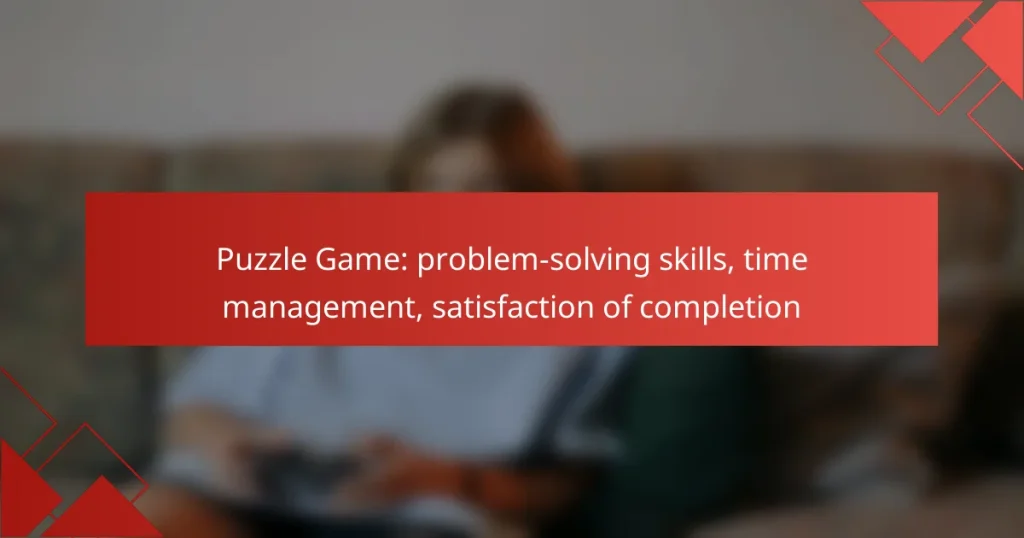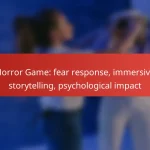Puzzle games are an excellent way to enhance problem-solving skills, as they encourage players to think critically and creatively while navigating various challenges. Time management plays a vital role in these games, enabling players to solve puzzles efficiently and improve their focus. The satisfaction of completing a puzzle not only brings a sense of fulfillment but also reinforces the skills developed during gameplay.
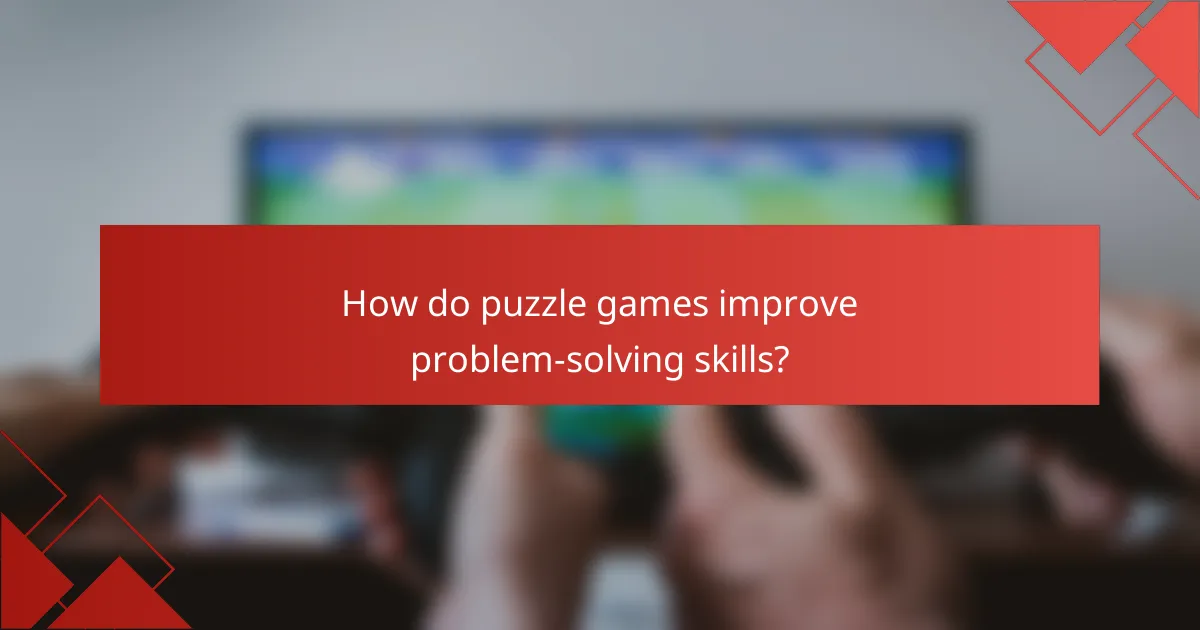
How do puzzle games improve problem-solving skills?
Puzzle games enhance problem-solving skills by challenging players to think critically and creatively to overcome obstacles. These games require players to analyze situations, strategize, and make decisions under time constraints, fostering a mindset geared towards effective problem resolution.
Enhanced critical thinking
Critical thinking is vital in puzzle games as players must evaluate information, identify patterns, and draw conclusions. Engaging with complex puzzles encourages players to question assumptions and explore various solutions, leading to improved reasoning abilities.
For example, games that require players to solve riddles or logic problems often present multiple paths to a solution, prompting deeper analysis and consideration of the consequences of each choice.
Increased cognitive flexibility
Cognitive flexibility refers to the ability to adapt one’s thinking to new and unexpected conditions. Puzzle games frequently introduce new challenges that require players to shift their strategies and approaches, enhancing their adaptability.
Players learn to switch between different problem-solving techniques, which can be beneficial in real-life scenarios where situations often change rapidly and require quick thinking.
Boosted analytical skills
Analytical skills are sharpened through the systematic breakdown of puzzles into manageable parts. Players learn to assess the components of a problem, prioritize tasks, and develop step-by-step solutions.
Games that involve resource management or complex strategy often require players to analyze data and make informed decisions, reinforcing their analytical capabilities.
Real-world applications
The skills developed through puzzle games have practical applications in everyday life and various professions. Enhanced problem-solving abilities can lead to better decision-making in work environments, academic settings, and personal situations.
For instance, professionals in fields such as engineering, finance, and healthcare often rely on strong analytical and critical thinking skills to navigate complex challenges effectively.
Examples of effective puzzle games
Several puzzle games are particularly effective at improving problem-solving skills. Popular titles include:
- Portal: A physics-based puzzle game that requires players to think creatively about spatial relationships.
- Sudoku: A number-placement puzzle that enhances logical reasoning and pattern recognition.
- The Witness: An exploration puzzle game that challenges players to solve intricate environmental puzzles.
These games not only entertain but also serve as valuable tools for developing essential cognitive skills.
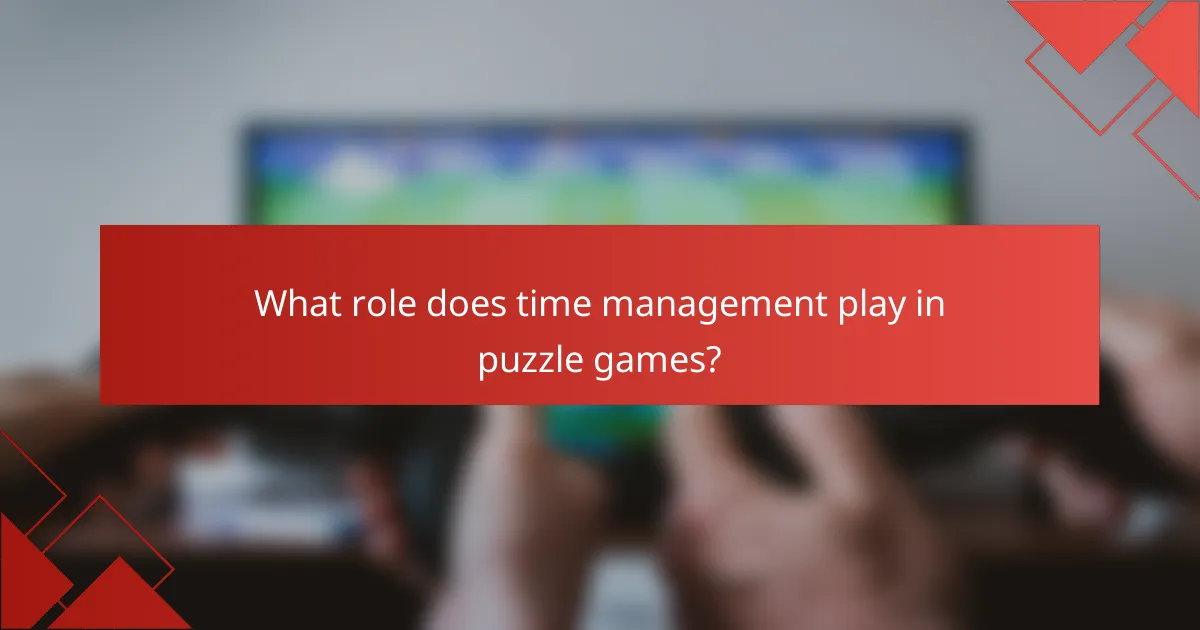
What role does time management play in puzzle games?
Time management is crucial in puzzle games as it directly affects a player’s ability to solve challenges efficiently. By effectively managing their time, players can enhance their focus, improve their problem-solving skills, and ultimately experience greater satisfaction upon completion.
Time constraints enhance focus
Time constraints in puzzle games create a sense of urgency that sharpens a player’s concentration. When faced with a ticking clock, players are more likely to prioritize tasks and eliminate distractions, leading to quicker decision-making. This heightened focus can result in improved performance and a more engaging gaming experience.
For example, many puzzle games feature timed challenges where players must complete levels within a set period. This not only increases the excitement but also encourages players to think critically and act swiftly.
Strategies for effective time management
To manage time effectively in puzzle games, players can adopt several strategies. One effective approach is to break down complex puzzles into smaller, manageable tasks. This allows for a clearer focus on each component, making it easier to solve the overall challenge.
Another strategy is to practice regularly to improve speed and familiarity with different puzzle types. Players can also set personal time limits for each level to develop a sense of pacing, which can be beneficial during timed challenges.
Impact on daily productivity
The skills developed through time management in puzzle games can translate to improved productivity in daily life. Players often learn to prioritize tasks, make quick decisions, and manage stress effectively, which are valuable skills in both personal and professional settings.
Additionally, engaging with puzzle games can serve as a productive break from routine tasks, helping to refresh the mind. This balance can lead to enhanced overall productivity, as players return to their responsibilities with renewed focus and energy.
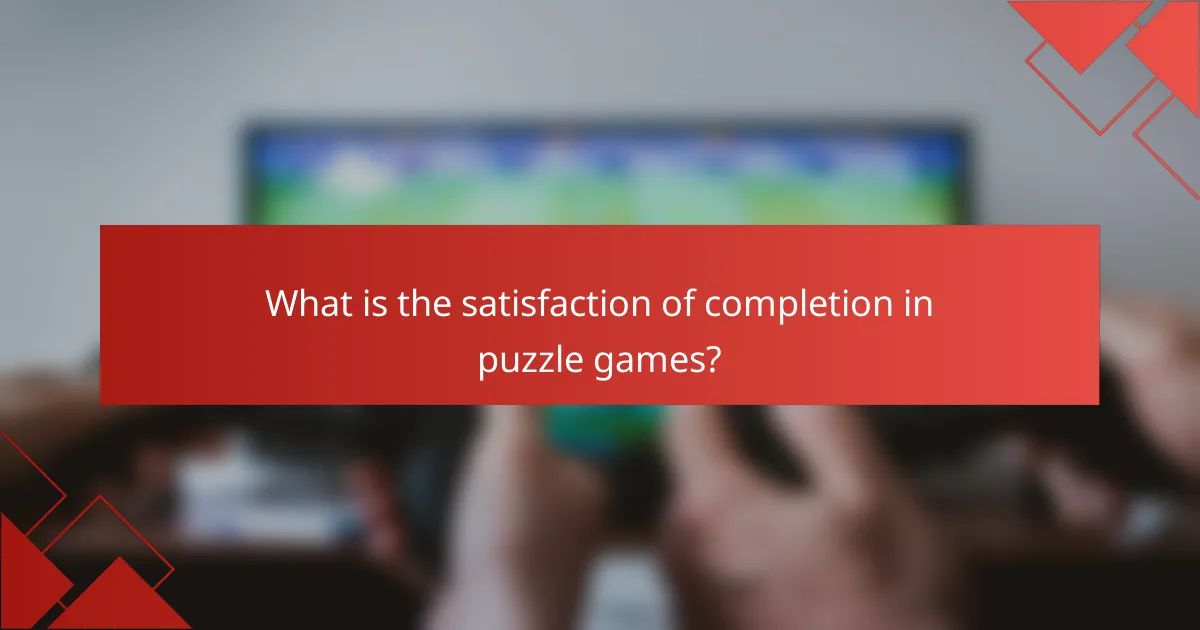
What is the satisfaction of completion in puzzle games?
The satisfaction of completion in puzzle games refers to the sense of fulfillment players experience upon solving challenges and finishing levels. This feeling often stems from overcoming obstacles, utilizing problem-solving skills, and effectively managing time throughout the gameplay.
Sense of achievement
Completing a puzzle game provides a strong sense of achievement, as players often face increasing levels of difficulty. Each solved puzzle reinforces confidence and encourages players to tackle more complex challenges. This progression can lead to a rewarding cycle of accomplishment, motivating players to continue engaging with the game.
For example, successfully finishing a particularly challenging level can evoke feelings of pride and satisfaction, often prompting players to share their achievements with others. The more difficult the puzzle, the greater the sense of achievement upon completion.
Psychological benefits
Puzzle games can offer various psychological benefits, including improved cognitive skills and enhanced mood. Engaging in problem-solving activities stimulates the brain, promoting critical thinking and creativity. Players often experience a boost in self-esteem as they navigate through challenges and achieve their goals.
Additionally, the satisfaction of completing puzzles can lead to reduced stress levels. The focus required to solve puzzles can serve as a form of mindfulness, allowing players to escape from daily pressures and enjoy a moment of accomplishment.
Community engagement and sharing
The satisfaction of completion in puzzle games often extends beyond individual achievement, fostering community engagement. Many players enjoy sharing their successes on social media or within gaming forums, creating a sense of camaraderie among enthusiasts. This sharing can lead to discussions about strategies, tips, and experiences related to specific puzzles.
Participating in community events or competitions can further enhance this engagement, as players come together to celebrate their achievements and challenge one another. Such interactions not only amplify the satisfaction of completion but also build lasting connections within the gaming community.
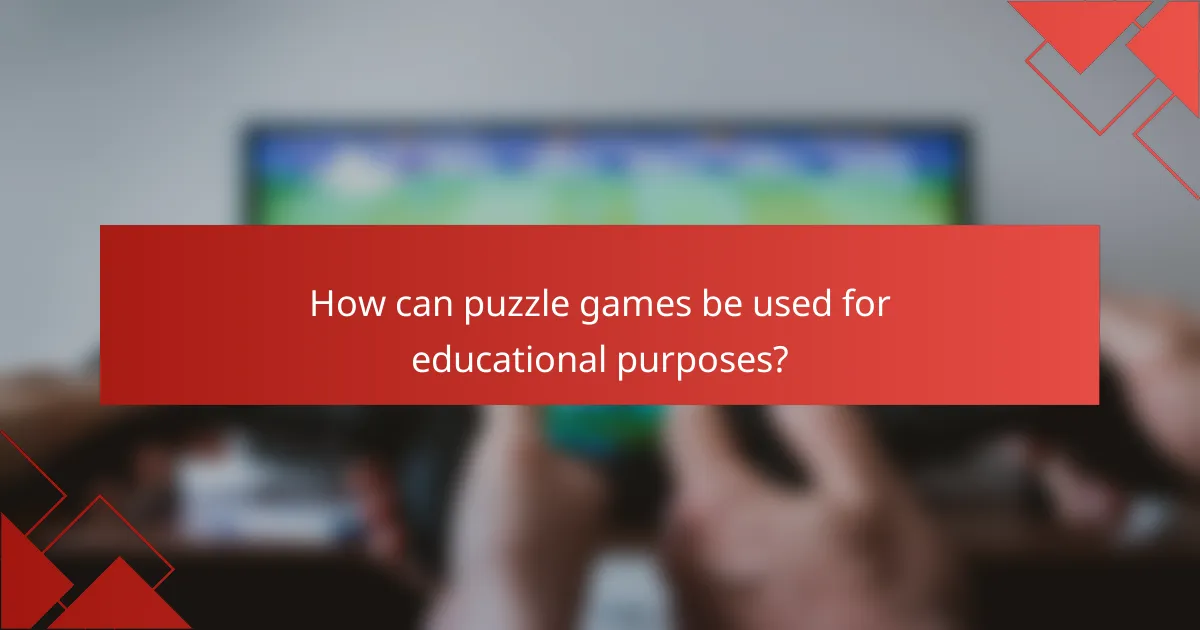
How can puzzle games be used for educational purposes?
Puzzle games can effectively enhance educational experiences by developing critical thinking, time management, and problem-solving skills. These games engage learners in a fun way, promoting satisfaction upon completion and reinforcing concepts through interactive challenges.
Teaching problem-solving techniques
Puzzle games are excellent tools for teaching problem-solving techniques as they require players to analyze situations, identify patterns, and devise strategies. By presenting challenges that demand logical reasoning and creative thinking, these games help learners practice breaking down complex problems into manageable parts.
Encouraging students to approach puzzles systematically can foster resilience and adaptability, essential traits for effective problem-solving. Incorporating discussions around different strategies used in games can further enhance understanding and application of these techniques in real-life scenarios.
Incorporating into classroom settings
Integrating puzzle games into classroom settings can create an interactive learning environment that motivates students. Teachers can use these games as warm-up activities or as part of project-based learning, allowing students to collaborate and share their problem-solving approaches.
It’s important to select games that align with educational objectives. For instance, games that focus on math or language skills can reinforce curriculum content while keeping students engaged. Setting clear goals and time limits can also help students manage their time effectively during these activities.
Examples of educational puzzle games
Several educational puzzle games are available that cater to various age groups and learning objectives. Games like “Rush Hour” enhance logical reasoning, while “Math Blaster” focuses on math skills through engaging puzzles.
Other notable examples include “Portal” for physics concepts and “Scrabble” for vocabulary development. These games not only promote learning but also provide a sense of accomplishment, making them valuable resources in educational settings.
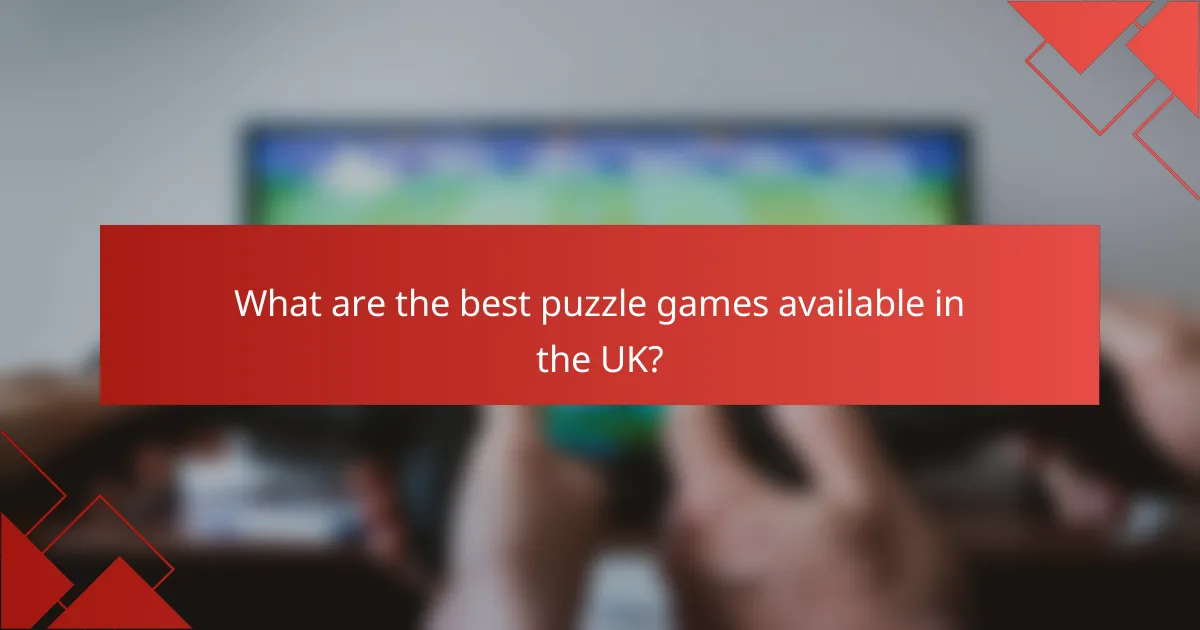
What are the best puzzle games available in the UK?
The best puzzle games in the UK offer a mix of challenging gameplay, engaging storylines, and satisfying completion experiences. Popular titles range across mobile, console, and online platforms, catering to various preferences and skill levels.
Popular mobile puzzle games
Mobile puzzle games are widely accessible and perfect for quick sessions. Titles like “Monument Valley” and “Two Dots” are known for their beautiful graphics and intuitive mechanics, making them enjoyable for players of all ages.
When choosing a mobile puzzle game, consider the game’s complexity and the time commitment required. Many games offer free versions with optional in-app purchases, allowing players to test them before fully committing.
Top-rated console puzzle games
Console puzzle games provide a more immersive experience, often featuring intricate narratives and high-quality graphics. Games like “The Witness” and “Portal 2” are highly regarded for their innovative puzzles and engaging gameplay.
When selecting a console puzzle game, look for titles that offer a balance of challenge and satisfaction. Many games include difficulty settings, enabling players to adjust the experience to their skill level.
Online platforms for puzzle games
Online platforms such as Steam and the Epic Games Store host a variety of puzzle games, ranging from indie titles to mainstream hits. These platforms often feature user reviews and ratings, helping players make informed choices.
Consider subscribing to services like Xbox Game Pass or PlayStation Plus, which provide access to a rotating selection of puzzle games. This can be a cost-effective way to explore multiple titles without purchasing each one individually.
